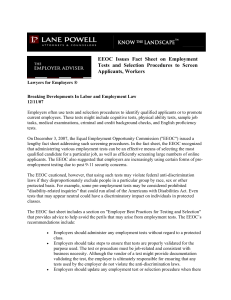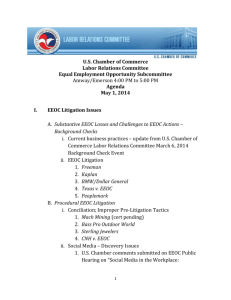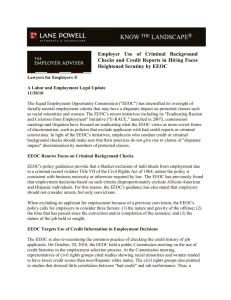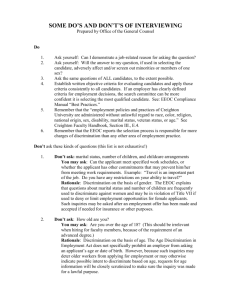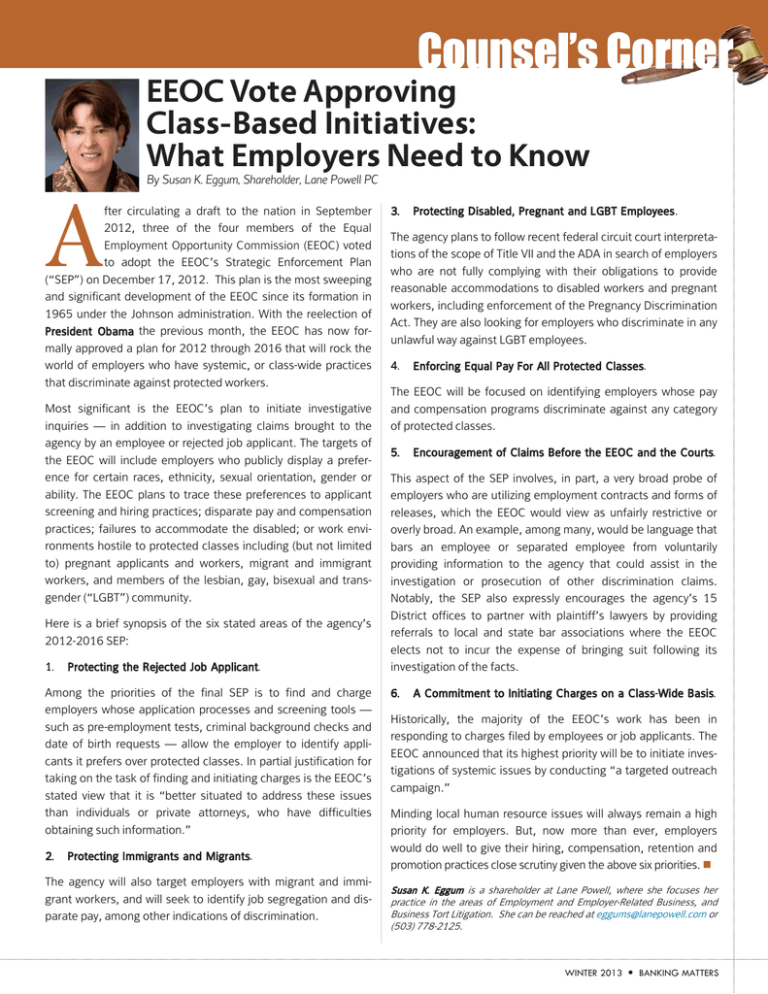
Counsel’s Corner
EEOC Vote Approving
Class-Based Initiatives:
What Employers Need to Know
By Susan K. Eggum, Shareholder, Lane Powell PC
A
fter circulating a draft to the nation in September
2012, three of the four members of the Equal
Employment Opportunity Commission (EEOC) voted
to adopt the EEOC’s Strategic Enforcement Plan
(“SEP”) on December 17, 2012. This plan is the most sweeping
and significant development of the EEOC since its formation in
1965 under the Johnson administration. With the reelection of
President Obama the previous month, the EEOC has now formally approved a plan for 2012 through 2016 that will rock the
world of employers who have systemic, or class-wide practices
that discriminate against protected workers.
Most significant is the EEOC’s plan to initiate investigative
inquiries — in addition to investigating claims brought to the
agency by an employee or rejected job applicant. The targets of
the EEOC will include employers who publicly display a preference for certain races, ethnicity, sexual orientation, gender or
ability. The EEOC plans to trace these preferences to applicant
screening and hiring practices; disparate pay and compensation
practices; failures to accommodate the disabled; or work environments hostile to protected classes including (but not limited
to) pregnant applicants and workers, migrant and immigrant
workers, and members of the lesbian, gay, bisexual and transgender (“LGBT”) community.
Here is a brief synopsis of the six stated areas of the agency’s
2012-2016 SEP:
1.
Protecting the Rejected Job Applicant.
Among the priorities of the final SEP is to find and charge
employers whose application processes and screening tools —
such as pre-employment tests, criminal background checks and
date of birth requests — allow the employer to identify applicants it prefers over protected classes. In partial justification for
taking on the task of finding and initiating charges is the EEOC’s
stated view that it is “better situated to address these issues
than individuals or private attorneys, who have difficulties
obtaining such information.”
2.
Protecting Immigrants and Migrants.
The agency will also target employers with migrant and immigrant workers, and will seek to identify job segregation and disparate pay, among other indications of discrimination.
3.
Protecting Disabled, Pregnant and LGBT Employees.
The agency plans to follow recent federal circuit court interpretations of the scope of Title VII and the ADA in search of employers
who are not fully complying with their obligations to provide
reasonable accommodations to disabled workers and pregnant
workers, including enforcement of the Pregnancy Discrimination
Act. They are also looking for employers who discriminate in any
unlawful way against LGBT employees.
4.
Enforcing Equal Pay For All Protected Classes.
The EEOC will be focused on identifying employers whose pay
and compensation programs discriminate against any category
of protected classes.
5.
Encouragement of Claims Before the EEOC and the Courts.
This aspect of the SEP involves, in part, a very broad probe of
employers who are utilizing employment contracts and forms of
releases, which the EEOC would view as unfairly restrictive or
overly broad. An example, among many, would be language that
bars an employee or separated employee from voluntarily
providing information to the agency that could assist in the
investigation or prosecution of other discrimination claims.
Notably, the SEP also expressly encourages the agency’s 15
District offices to partner with plaintiff’s lawyers by providing
referrals to local and state bar associations where the EEOC
elects not to incur the expense of bringing suit following its
investigation of the facts.
6.
A Commitment to Initiating Charges on a Class-Wide Basis.
Historically, the majority of the EEOC’s work has been in
responding to charges filed by employees or job applicants. The
EEOC announced that its highest priority will be to initiate investigations of systemic issues by conducting “a targeted outreach
campaign.”
Minding local human resource issues will always remain a high
priority for employers. But, now more than ever, employers
would do well to give their hiring, compensation, retention and
promotion practices close scrutiny given the above six priorities.
Susan K. Eggum is a shareholder at Lane Powell, where she focuses her
practice in the areas of Employment and Employer-Related Business, and
Business Tort Litigation. She can be reached at eggums@lanepowell.com or
(503) 778-2125.
WINTER 2013 BANKING MATTERS

